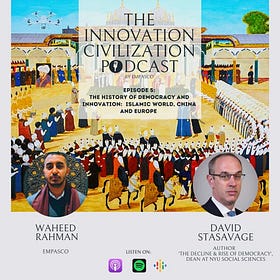David Stasavage
Joined us to discuss the history and evolution of democracy, drawing from his influential work The Decline and Rise of Democracy: A Global History from Antiquity to Today
Dean of Social Sciences at New York University and renowned political scientist, David Stasavage joined us to discuss the history and evolution of democracy, drawing from his influential work The Decline and Rise of Democracy: A Global History from Antiquity to Today. His insights spanned across centuries and continents, offering a broad perspective on how democracy emerged, evolved, and continues to adapt to modern challenges.
Stasavage’s work breaks away from traditional narratives that focus solely on ancient Greece and Europe, revealing democratic practices that flourished in other regions, such as Mesopotamia and precolonial Africa. His analysis provides a deeper understanding of the factors that led to democracy’s rise and decline in different historical contexts. He explains how smaller, decentralized states with weaker bureaucratic structures were more likely to develop democratic governance as a means of ensuring consent from the populaceDavid Stasavage Princeton University Press
The History of Democracy and Innovation : Islamic World, China, and Europe
You can listen to it by clicking on your favorite podcast platform of choice, as above.
Biography
David Stasavage is a leading expert in political science and economic history, with a career dedicated to studying democracy, fiscal fairness, and governance. He has authored several significant works, including Taxing the Rich: A History of Fiscal Fairness in the United States and Europe, which examines how societies have grappled with inequality and wealth distribution through tax policiesDavid Stasavage Wikipedia
Stasavage’s interdisciplinary approach combines political science, history, and economics, making his research influential across multiple fields.
The Decline and Rise of Democracy
In his book The Decline and Rise of Democracy, Stasavage explores the complex evolution of democratic systems, from early forms of participatory governance to the modern representative democracies we see today. He argues that democracy emerged not just from philosophical ideals but from practical needs, such as maintaining order in small, decentralized societies. The book’s global perspective sheds light on the various paths democracy has taken and provides lessons for modern governance Princeton University Press Lycoming College
Thought Leadership
David Stasavage’s work is crucial in understanding not just the historical roots of democracy but also its future trajectory. His contributions to political science encourage us to rethink the narratives of democracy's development, focusing on the diversity of democratic practices worldwide and the social, economic, and technological factors that shape governance systems. His ongoing research continues to push the boundaries of how we understand democracy’s role in addressing today’s political and social challenges.
David Stasavage's work serves as a vital resource for anyone interested in how democracy has evolved and what lessons history holds for its future.


